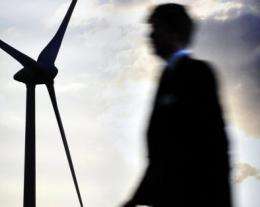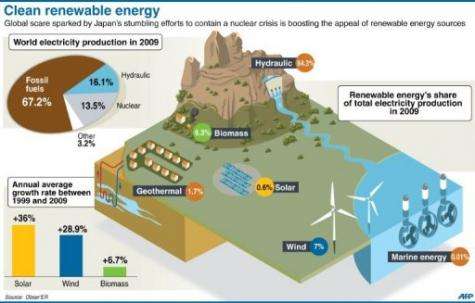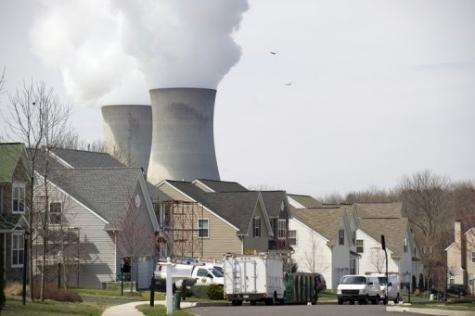Japan nuclear scare boosts renewables lobby

A global scare sparked by Japan's stumbling efforts to contain a nuclear crisis is encouraging promoters of renewable energy, but defenders of atomic power insist it has a long-term future.
Until the giant earthquake and tsunami that struck northeastern Japan on March 11 damaged the Fukushima plant, nuclear power was emerging as one of the main choices for countries looking at cleaner, alternative energy options.
Because it is free from carbon emissions, atomic power has been held up as a major plank in the battle to fight global warming, and now accounts for about 14 percent of the world's electricity supply.
But daily television images of the struggle to cool down overheated reactors at Fukishima have generated concern in countries that import Japanese food and other products, and reinforced long-held fears over nuclear technology.
"The Fukushima crisis may result in significant changes in energy policy in Asia, reducing plans for nuclear energy and boosting liquefied natural gas and renewables," said Rajiv Biswas, chief Asia economist at IHS Global Insight.
"It will refocus government efforts to boost renewable energy sources including solar, wind and geothermal energy," the Singapore-based economist said.
In cases where democratic governments insist on building nuclear power plants, "the public can force them to reconsider", he added.
Globally, there are more than 440 active commercial nuclear power reactors in 30 countries, producing 377,000 megawatts of electricity, according to the World Nuclear Association.

Of 62 reactors currently being built around the world, 40 are in Asia, and 96 of the 158 being planned are also in the region, the association's figures show.
Samantha Smith, leader for global climate and energy initiative at the environmental group WWF International, which opposes atomic power, said Fukushima has prompted "a resurgence in support for alternatives to nuclear".
She cited the decision of European leaders to carry out "stress tests" for the continent's nuclear plants, China's cutting of nuclear power targets and a German moratorium on further operation of older reactors as evidence of the changing mood.
In addition, the market values of many companies and utilities involved with, and investing in, nuclear power have dropped, while share prices of some renewable energy firms have risen, she told AFP.
"Investing in clean, renewable energy is clearly preferable to the unacceptable human, environmental and financial risks posed by nuclear power," Smith said.
However, Fatih Birol, chief economist of the International Energy Agency (IEA), conversely warned that a slowdown in the growth of nuclear power worldwide will seriously hamper the fight against climate change.

Since Fukushima, the IEA modelled the consequences if its earlier projection of 360 gigawatts of additional power from nuclear plants by 2035 is halved to 180 gigawatts, due to the more cautious attitude towards atomic plants.
Using coal, natural gas and "renewables" to take up the slack from nuclear energy would result in additional carbon dioxide (CO2) emissions of 500 million tonnes, Birol told AFP by telephone from the IEA's office in Paris.
It will also push up electricity prices -- due to higher demand for coal and gas to compensate for lost nuclear capacity -- and affect global energy security, he said.
Ian Hore-Lacy, a spokesman for the World Nuclear Association, said that when the high emotions sparked by Japan's nuclear crisis calmed down, the world will still need to look for energy sources to meet growing demand, and nuclear power will remain an option.
"When all this is sorted, world energy demand will be just the same as last week, the demand for reliable electricity supply will still be on a path to doubling in two decades," he told AFP.
"The options for meeting that demand will be just the same."
(c) 2011 AFP


















